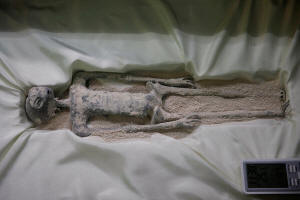A close encounter with the 'alien bodies' in Mexico
 Send a link to a friend
Send a link to a friend
 [September 16, 2023]
By Cassandra Garrison [September 16, 2023]
By Cassandra Garrison
MEXICO CITY (Reuters) - For Jaime Maussan, a Mexican journalist and
longtime UFO enthusiast, they are one of the most important discoveries
in the history of humankind.
But for many scientists these two tiny mummified bodies with elongated
heads and three fingers on each hand, images of which were beamed around
the world this week when they were presented to Mexico's Congress, are
an already-debunked - perhaps criminal - stunt.
At Maussan's office, in the Mexico City business district of Santa Fe,
staff members carefully carry the two closed boxes with glass lids
containing the bodies into a green-screened studio, where Reuters had
exclusive access on Friday.
Everyone huddles around to get a better look. The bodies appear ancient
and share characteristics with humans: two eyes, a mouth, two arms, two
legs. Maussan claims they were found around 2017 in Peru, near the
pre-Columbian Nazca Lines.
He says he can prove they are unlike anything known on Earth. On social
media and in the hearing, he shared scientific analysis and study
results he argues proves the bodies are about 1,000 years old and not
related to any known Earthly species.
One of them, described by Maussan as a female, was discovered to have
eggs inside, he said.
"It is the most important thing that has happened to humanity," Maussan,
70, said of his crusade to bring awareness to the findings, sitting in
his office that is heavily decorated with colorful alien-themed artwork
and paraphernalia.

"I believe that this phenomenon is the only one that gives us the
opportunity to unite," he added.
Elsa Tomasto-Cagigao, a respected Peruvian bio-anthropologist, is
frustrated such claims are still being given publicity, citing similar
alleged finds that were found to be frauds.
"What we said before still stands, they are presenting the same rehash
as always and if there are people that keep believing that, what can we
do?," she said by phone. "It is so crass and so simple that there is
nothing more to add."
Previous such finds have been dismissed by the scientific community as
mutilated mummies of pre-Hispanic children, sometimes combined with bits
of animal parts.
David Spergel, former head of Princeton University's astrophysics
department and chair of a NASA report into unidentified anomalous
phenomena, said on Thursday that such samples should be made available
for testing by the world's scientific community.
TESTING CONUNDRUM
Maussan shared on social media and in his presentation the results of
DNA and carbon dating tests that he said he commissioned on "the
beings."
A Mexican scientist, at the request of Reuters, reviewed the results and
concluded they indicated normal life on Earth.
Maussan told Reuters on Friday that the test results were not directly
related to the two bodies that he showed Congress this week, however. In
fact, he said, they were conducted on an entirely different body, known
as Victoria, that remains in Peru.
"They were found in the same place. They have the same physical
appearance, they are the same," Maussan said of Victoria and the two
bodies he presented in Mexico. Testing was not done on those two bodies
in order to avoid damaging them, he said.
[to top of second column]
|

A tiny body of a specimen, that Mexican journalist and UFO
enthusiast Jaime Maussan says is not related to any known Earthly
species and which he presented along with another one to Mexico's
Congress earlier this week, is pictured, in Mexico City, Mexico
September 15, 2023. REUTERS/Raquel Cunha

Maussan is no stranger to controversy. He has made claims about
other remains in the past that have been widely criticized. He
participated in a 2017 TV documentary about other remains found near
the Nazca Lines, which experts like Tomasto-Cagigao and
paleontologist Rodolfo Salas-Gismondi have said appeared to feature
doctored mummies.
Now, he has angered Peruvian officials.
Peruvian Culture Minister Leslie Urteaga has questioned how the
specimens, which she said were pre-Hispanic objects, left Peru and
says a criminal complaint has been filed.
"I'm not worried. I have done absolutely nothing illegal," Maussan
said.
How the bodies arrived in Mexico is a question he says he cannot
answer. Borrowed by Maussan for the hearing, they are in the
possession of a Mexican man, who was in Maussan's office on Friday
and who declined to be identified.
When asked how the bodies - whom he called Clara and Mauricio - came
to be in his possession, the man replied only that he would reveal
all "at the appropriate time."
Jose de Jesus Zalce Benitez, Director of the Health Sciences
Research Institute of the Secretary of the Navy, participated in the
congressional hearing, bolstering Maussan's claims. Now joining him
at his office, he calmly explained his interpretation of the
science.
"Based on the DNA tests, which were compared with more than one
million species ... they are not related to what is known or
described up to this moment by science or by human knowledge," he
said.
Julieta Fierro, the scientist at Mexico's National Autonomous
University's (UNAM) Institute of Astronomy who reviewed Maussan's
test results for Reuters, sees far less mystery in the data.
She said that the presence of carbon-14 in studies done by UNAM
proves that the samples were related to brain and skin tissues from
different mummies who died at different times.

The proportion of the radioactive carbon-14 isotope that is absorbed
by living organisms into their tissue decays over time, which allows
scientists to determine the approximate year of death of the
specimen.
On other planets, the amount of carbon-14 in their atmospheres would
not necessarily be the same as on Earth, she said.
All in all, the results "do not show anything mysterious that could
indicate life compounds that do not exist on Earth," Fierro said.
(Reporting by Cassandra Garrison in Mexico City; additional
reporting by Marco Aquino in Lima; editing by Stephen Eisenhammer
and Rosalba O'Brien)
[© 2023 Thomson Reuters. All rights
reserved.]This material may not be published,
broadcast, rewritten or redistributed.
Thompson Reuters is solely responsible for this content. |